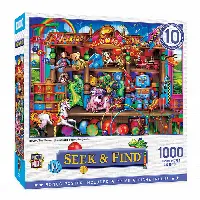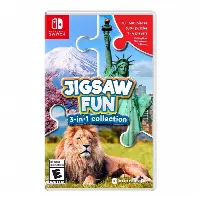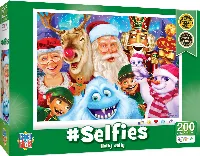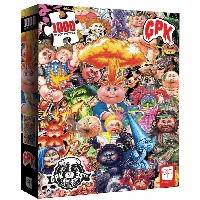Finding Your Fit in the World of Jigsaw Puzzles: A Buyer's Guide

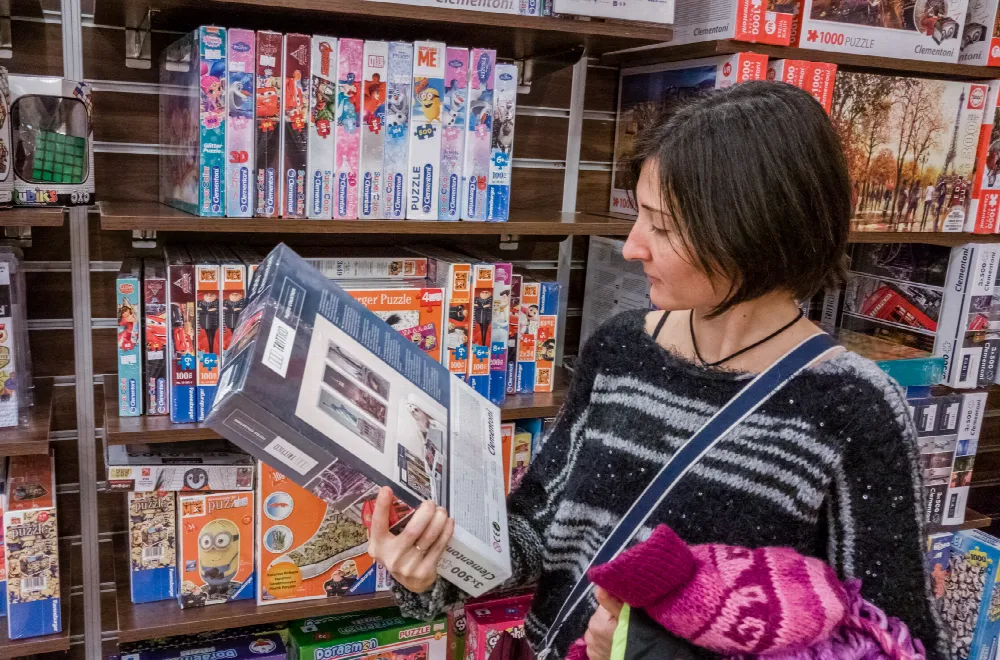
Jigsaw puzzles have long held a special place in the hearts of those who love a good challenge mixed with a dash of art. From quaint cottages nestled in idyllic landscapes to the wild, abstract splashes of color, puzzles offer something for everyone. And it's not just about the fun; assembling a jigsaw puzzle can be a meditative, almost therapeutic experience, giving your brain a much-needed workout.
In recent years, the humble jigsaw puzzle has seen a resurgence in popularity. It's a hobby that transcends age and skill, inviting players to step away from digital screens and engage in a tangible, hands-on activity. Whether it's a 300-piece puzzle that's a perfect starter for beginners or a mammoth 40,320-piece challenge that could take months to complete, there's a sense of accomplishment in fitting that final piece into place.
The world of jigsaw puzzles is vast and varied. Choosing the right one can be as complex as the puzzles themselves. In this article, we'll explore key factors to consider when selecting your next jigsaw puzzle. From size and difficulty to themes and materials, we've got you covered. So, if you're ready to dive into the world of jigsaw puzzles, let's piece together the essentials to help you find your perfect match.
Piece by Piece: Understanding Puzzle Sizes
When it comes to jigsaw puzzles, size really does matter. It's not just a question of how many pieces you can handle before your coffee goes cold, but also about how much space you can dedicate to this endeavor. Puzzles come in a delightful variety of sizes, each offering its own unique challenge and charm.
- Small and Sweet: 100 to 500 Pieces
Perfect for beginners, kids, or those looking for a quick puzzle fix, these smaller puzzles can be completed in a single sitting. They're great for a cozy evening in or a fun family activity. The images tend to be simpler, but that doesn't make them any less enjoyable. Plus, they're a great way to dip your toes into the puzzling world without feeling overwhelmed.
- The Middle Ground: 500 to 1,000 Pieces
Stepping up the game, puzzles in this range offer a moderate challenge suitable for most casual puzzlers. They require more time and patience but are still manageable for most. These puzzles strike a nice balance, offering a satisfying challenge without taking over your dining table for weeks.
- The Commitment: 1,000 to 2,000 Pieces
Now we're entering serious puzzler territory. These are ideal for those who enjoy a prolonged puzzling experience. The images are more intricate, and the challenge is definitely upped. If you've got the space (and the patience), these puzzles can be a deeply rewarding way to spend your downtime.
- The Puzzle Titan: 2,000 Pieces and Beyond
For the brave, the bold, and the seriously puzzle-obsessed, large puzzles of 2,000 pieces and more are the ultimate test of skill and perseverance. These mammoth puzzles are not just a pastime; they're a commitment, often requiring dedicated space and days, if not weeks, of puzzling time. They're perfect for seasoned puzzlers looking for a significant challenge and a spectacular result.
When selecting your puzzle size, consider your experience level, available space, and how much time you're willing to commit. Remember, the journey is just as important as the destination. Choose a size that matches your lifestyle and puzzling aspirations. After all, it's about enjoying the process, piece by piece.
Themes and Images - The Fun Part!
Selecting the theme and image of your jigsaw puzzle is a delightful expression of your personality and interests. From serene landscapes to vibrant pop culture icons, there's a puzzle out there waiting to reflect your unique taste.

- Nature's Majesty: Landscapes and Wildlife
For those who find solace in nature, puzzles featuring landscapes and wildlife offer a tranquil challenge. Piece together a serene mountain scene, a colorful coral reef, or a majestic forest, creating your own piece of natural wonder.
- Artistic Flair: Masterpieces and Abstracts
Art enthusiasts can rejoice in puzzles that replicate famous paintings or abstract designs. Assemble a Van Gogh or a Monet, or delve into vivid abstract patterns. It's an engaging way to connect with art history and contemporary designs.
- Travel Dreams: Famous Cities and Landmarks
These puzzles transport you around the globe, from the Eiffel Tower to the streets of Venice. Perfect for those bitten by the travel bug, these puzzles let you explore the world's wonders one piece at a time.
- Whimsy and Wonder: Cartoons and Fantasy
Ideal for the young and young-at-heart, puzzles with cartoon characters, fantasy landscapes, or mythical creatures add a touch of whimsy and magic to your puzzling experience. They're a playful escape into imaginative worlds.
- Pop Culture Pizzazz: Movies, TV Shows, and More
For fans of movies, TV shows, music, or sports, pop culture puzzles are a perfect match. Assemble iconic scenes from your favorite films, portraits of beloved characters, or legendary album covers. These puzzles not only challenge but also celebrate the fandoms and pop culture moments you love.
- Personalized Puzzles: Custom Images
Create a puzzle that's uniquely yours with a custom image. Whether it's a cherished family photo, a beloved pet, or a personal artwork, turning it into a puzzle adds an intimate and memorable twist to your puzzling adventure.
Think about what inspires or excites you when selecting your puzzle's theme. Whether it's the tranquility of nature, the allure of art, the thrill of travel, the fun of fantasy, the energy of pop culture, or the warmth of personal memories, your choice will shape a rewarding and enjoyable puzzling journey.
Material Matters
When it comes to jigsaw puzzles, what they're made of is just as important as the image on the front. The material not only affects the puzzle's durability and feel but also your overall puzzling experience. Here's a breakdown of the most common materials you'll encounter.
- Cardboard: The Classic Choice
Most jigsaw puzzles are made from high-quality cardboard. These puzzles are affordable, lightweight, and come in a vast array of designs. Look for cardboard puzzles with a good 'snap' - a satisfying click when two pieces fit perfectly. The best quality cardboard puzzles have a fine, linen-like texture to reduce glare and provide a better grip.
- Wood: Durable and Timeless
Wooden puzzles are the heirlooms of the puzzle world. They are more durable and have a distinct, tactile feel that many enthusiasts love. Wooden pieces are thicker, often with unique shapes and intricate cut patterns, making them a delight to handle and assemble. They tend to be more expensive but can last for generations, making them a great keepsake.
- Plastic: Resilient and Washable
Plastic puzzles offer a modern twist. They are resilient, washable, and often come in 3D forms, adding an extra dimension to your puzzling. These are particularly great for kids since they're more durable and can handle a bit of rough play. Plus, the glossy finish gives the completed puzzle a sleek look.
- Foam: Soft and Safe for Kids
Foam puzzles are primarily designed for younger children. They are soft, safe, and often larger, making them easy for little hands to hold and put together. These puzzles are excellent for developing motor skills and are often used in educational settings.
- Magnetic: For Puzzles on the Go
Magnetic puzzles are a nifty innovation, perfect for puzzlers on the move. The pieces stick to a metal surface, making them ideal for travel or compact living spaces. They're also a great solution if you have pets or kids who might accidentally disrupt a work-in-progress puzzle.
When selecting your puzzle material, consider where and how you'll be assembling it. If you're looking for a family-friendly option, cardboard or plastic might be your best bet. For a more luxurious, long-lasting choice, wood is unparalleled. And if you're often on the go, a magnetic puzzle could be a game-changer. Remember, the right material can enhance your puzzle experience and make every piece fall into place just right.
Difficulty Levels - Not Just for the Brave
Jigsaw puzzles come in a variety of difficulty levels, catering to everyone from the casual assembler to the hardcore puzzler. The level of challenge you choose can greatly impact your enjoyment and satisfaction. Here's a guide to understanding the different difficulty levels in the world of jigsaw puzzles.
- Beginner: A Friendly Start
Ideal for newbies or those looking for a relaxing experience, beginner puzzles usually range from 100 to 500 pieces. They typically feature larger pieces and simpler images with clear distinctions. These puzzles are a great way to get acquainted with the puzzling world without feeling overwhelmed.
- Intermediate: Stepping Up the Game
Intermediate puzzles, often ranging from 500 to 1,000 pieces, are perfect for those who have mastered the basics and are ready for more. These puzzles offer a moderate challenge, with more intricate images and smaller pieces. They're a great way to enjoy a longer puzzling project that still feels approachable.
- Advanced: For the Avid Puzzler
With piece counts ranging from 1,000 to 2,000, advanced puzzles are designed for experienced puzzlers who enjoy a good challenge. These puzzles feature complex images with subtle color gradations, smaller piece sizes, and more intricate shapes. Completing an advanced puzzle is a satisfying feat that requires patience and skill.
- Expert: The Ultimate Challenge
Expert-level puzzles, often exceeding 2,000 pieces, are the ultimate test of your puzzling abilities. These mammoth puzzles can include complex patterns, a vast array of colors, and even repetitive designs that can boggle the mind. They are time-consuming and demanding but offer an incredibly rewarding experience for the truly dedicated puzzler.
- Specialty Puzzles: Adding a Twist
Beyond the traditional, there are specialty puzzles that add extra layers of difficulty. These include 3D puzzles, double-sided puzzles, and puzzles with irregular edges or no edges at all. These unique challenges require a different approach and can be a fun twist for those looking to spice up their puzzling routine.
When selecting a puzzle, consider your experience level and what you enjoy about puzzling. If you're looking for a soothing way to unwind, a beginner or intermediate puzzle might be perfect. For those seeking a satisfying challenge, advanced or expert levels await. And if you're in the mood for something different, specialty puzzles offer unique and exciting challenges. Whatever your choice, each puzzle presents its own joys and trials, so choose the level that aligns with your puzzling goals and enjoy the journey!
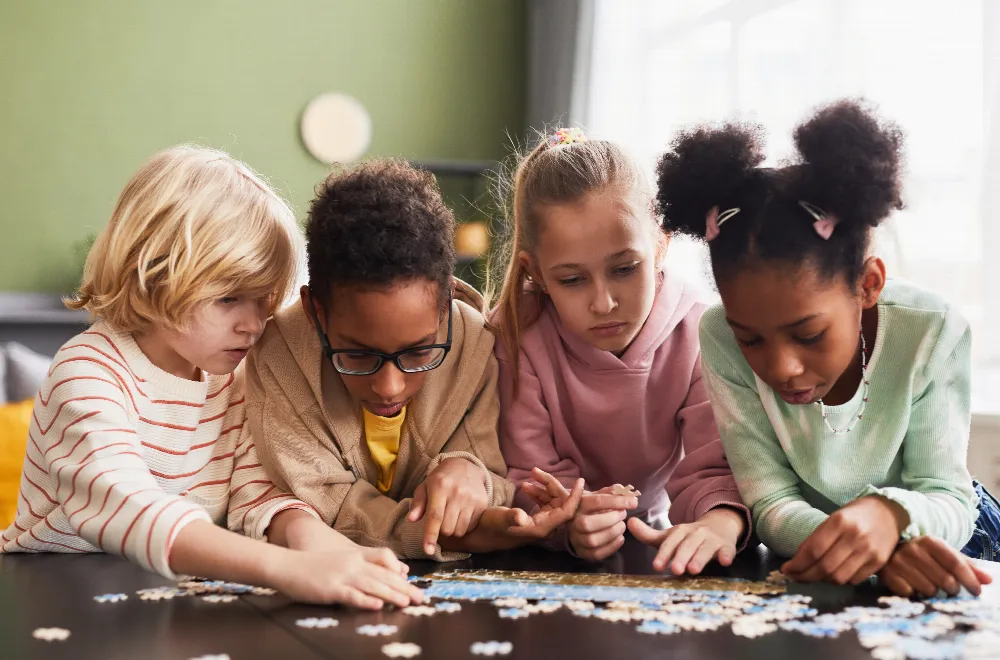
Age-Appropriate Puzzling
Jigsaw puzzles are a timeless hobby that transcends age groups, offering benefits and enjoyment to puzzlers of all ages. Choosing an age-appropriate puzzle is crucial for ensuring a fulfilling and frustration-free experience. Here's a guide to selecting puzzles suited to different age groups.
- Toddlers (Ages 1-3): Learning Through Play
For toddlers, puzzles are more than just fun; they're educational tools that aid in developmental milestones. Puzzles for this age group typically range from 2 to 12 large pieces. They're often brightly colored with simple, recognizable shapes and images like animals, vehicles, or basic objects. These puzzles help toddlers develop hand-eye coordination, fine motor skills, and problem-solving abilities.
- Young Children (Ages 4-6): Exploring and Growing
As children grow, they can handle more complexity in puzzles. Puzzles for this age range usually have 12 to 50 pieces. Themes often include favorite cartoon characters, animals, or simple scenes. These puzzles continue to support cognitive development and can help improve memory and attention to detail.
- Older Children (Ages 7-12): Increasing Challenge and Interest
Older children are ready for puzzles that are more challenging and detailed, typically ranging from 50 to 300 pieces. The themes can be more varied and sophisticated, including landscapes, space, science, and history, catering to the growing interests and educational needs of this age group. These puzzles help in enhancing patience, concentration, and logical thinking.
- Teenagers: Complex Puzzles for Skill Development
Teenagers might enjoy puzzles that range from 300 to 1,000 pieces, offering a substantial challenge. Puzzles with complex designs, such as intricate landscapes, detailed art pieces, or 3D puzzles, can be particularly appealing. These puzzles can be a great stress-reliever and also help in developing perseverance and attention to detail.
- Adults: From Relaxation to Brain Training
Adult puzzlers have a wide range of options, from 500-piece puzzles for a relaxing evening to 5,000-piece challenges for the more ambitious. Adult puzzles can serve as a meditative escape from daily stress or a way to keep the mind sharp. Themes can vary widely, from serene nature scenes to intricate abstract designs, reflecting personal interests and aesthetic preferences.
- Seniors: Keeping the Mind Active
For seniors, puzzles can be an excellent way to keep the mind active and engaged. Puzzles ranging from 100 to 500 pieces with larger, easy-to-handle pieces are often ideal. Themes that evoke nostalgia or are related to hobbies and interests can add an extra layer of enjoyment.
When selecting a puzzle, consider the skill level and interests of the age group you're choosing for. Puzzles can be a source of growth, challenge, and joy at any age. The key is to find the right balance between difficulty and enjoyment, ensuring that the puzzling experience is both engaging and rewarding.
Where to Buy Your Puzzle Prize
Once you've decided on the size, theme, material, and difficulty level of your desired jigsaw puzzle, the next step is to find out where you can purchase it. There are several options, each with its own set of advantages. Let's explore where you can snag your next puzzle prize.
- Local Toy and Hobby Stores
Starting locally is a great way to support small businesses while finding your perfect puzzle. Local toy and hobby stores often have a curated selection, and the staff can provide personalized recommendations based on your interests and skill level. Plus, there's the instant gratification of walking out with a puzzle in hand!
- Bookstores
Many bookstores have expanded their inventory to include jigsaw puzzles. Browsing in a bookstore can be a delightful experience, and you might find puzzles that align with literary themes, famous artworks, or educational content. It's a perfect spot for those who love to pair their reading with a bit of puzzling.
- Department Stores
Major department stores typically have a section dedicated to games and puzzles. While the selection might be more mainstream, these stores often offer competitive prices and frequent sales. They are a convenient option for those who want to grab a puzzle during their regular shopping trips.
- Online Retailers
For the widest selection, online shopping is the way to go. Websites like Amazon, Puzzle Warehouse, or specialized online puzzle stores offer an enormous variety of puzzles from different brands and artists. You can find reviews, compare prices, and have the puzzle delivered right to your doorstep. It's ideal for those looking for something specific or shopping from the comfort of their home.
- Specialty Puzzle Shops
If you're looking for high-end, unique, or artisan puzzles, specialty puzzle shops are your best bet. These stores often feature puzzles made from premium materials, with unique designs and themes. They might be pricier, but the quality and uniqueness can be worth the extra cost for serious puzzlers.
- Second-Hand and Thrift Stores
For bargain hunters, second-hand and thrift stores can be treasure troves for puzzles. While there's always a risk of missing pieces, you can often find vintage or out-of-production puzzles at a fraction of the original cost. It's an eco-friendly and budget-friendly option.
Consider your priorities: Do you want to browse in person or have more options online? Are you looking for a bargain or a specialty item? Each shopping destination offers a different experience and selection, so choose the one that aligns with your puzzle needs and shopping preferences. Happy puzzle hunting!
Conclusion
Embarking on the quest for the perfect jigsaw puzzle can be as exciting as the puzzling journey itself. From choosing the right size and theme to selecting the ideal material and difficulty level, every decision shapes your unique puzzle experience. Whether you're a first-time puzzler or a seasoned pro, there's always something new to discover in the ever-expanding world of jigsaw puzzles.
Remember, the key to a great puzzling experience lies in finding a balance that suits your interests, skill level, and lifestyle. A puzzle should be challenging enough to keep you engaged, but not so difficult that it becomes a source of frustration. It's not just about completing the picture; it's about enjoying the process, piece by piece.
As we've explored, there are countless options available, whether you're shopping at a local store, browsing online, or hunting for treasures in a thrift shop. Each puzzle brings with it the promise of hours of entertainment, a test of patience and skill, and often, a beautiful piece of art to admire upon completion.
We hope this guide has equipped you with the knowledge and inspiration to select your next jigsaw puzzle. May each puzzle you complete bring you a sense of accomplishment and joy. So go ahead, choose your next challenge, and let the puzzling adventure begin!
